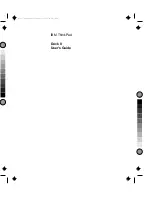
User’s Manual
3-5
Getting Started
Lighting
Select the right level of illumination and place your PC appropriately to
minimize glare from overhead lights, desk lamps and windows. Glare on
the LCD or monitor may cause eye strain, eye fatigue or headaches.
Consider the following suggestions regarding lighting your work
environment:
■
Position the PC so that the light source does not shine or reflect directly
onto the display or shine or reflect directly into the eyes of the user.
■
Shield the PC from direct light by using tinted windows or by installing
blinds or a screen.
■
Use soft, indirect lighting.
■
Adjust the display panel to provide maximum visibility.
Work habits
A key to avoiding discomfort or injury from repetitive strain is to vary your
activities. If possible, schedule a variety of tasks into your workday. If you
must spend long periods at the computer, finding ways to break up the
routine can reduce stress and improve your efficiency.
■
Sit in a relaxed posture. Good positioning of your chair and equipment
as described earlier can reduce tension in your shoulders or neck and
ease back strain.
■
Vary your posture frequently.
■
Occasionally stand up and stretch or exercise briefly.
■
Exercise and stretch your wrists and hands a number of times during
the day.
■
Frequently, look away from the computer and focus your eyes on a
distant object for several seconds, for example 30 seconds every 15
minutes.
■
Take frequent short breaks instead of one or two long breaks, for
example, two or three minutes every half hour.
■
When you use a PC, rest your eyes periodically and relax or stretch
your muscles to avoid strain. If you experience discomfort while
operating the PC, stop immediately and rest. Continuous operation for
long periods without adequate rest may cause pain in the arms, wrists,
hands, back, neck or other parts of the body. If pain persists despite
rest, consult your doctor.
A number of books are available on ergonomics and repetitive strain injury
or repetitive stress syndrome. For more information on these topics or for
pointers on exercises for such stress points as hands and wrists, please
check with your library or book vendor. Also refer to the computer’s
Instruction Manual for Safety & Comfort.
Summary of Contents for PQG30
Page 1: ...Qosmio G30 TOSHIBA Qosmio G30 Portable Personal Computer User s Manual ...
Page 26: ...xxvi User s Manual Table of Contents ...
Page 30: ...xxx User s Manual Preface ...
Page 34: ...xxxiv User s Manual General Precautions ...
Page 82: ...3 16 User s Manual Getting Started ...
Page 118: ...4 36 User s Manual Operating Basics ...
Page 188: ...8 36 User s Manual Using the Remote Controller Front operation button and QosmioPlayer ...
Page 244: ...A 4 User s Manual Specifications ...
Page 264: ...C 10 User s Manual AT Commands ...
Page 272: ...D 8 User s Manual S registers ...
Page 276: ...E 4 User s Manual V 90 ...
Page 286: ...G 6 User s Manual TOSHIBA RAID ...
Page 294: ...H 8 User s Manual Bluetooth wireless technology Interoperability ...
Page 298: ...J 2 User s Manual Usage Restrictions ...
Page 317: ...User s Manual Index 5 Index X xD picture card 9 9 inserting 9 9 removing 9 9 ...
Page 318: ...Index 6 User s Manual Index ...
















































